It can be quite concerning when a mother dog separates one of her puppies from the rest for no apparent reason.
Though it can seem mysterious, there is usually an underlying scientific explanation for why mom dog separates one puppy from the rest.
Key Takeaway
- A mother dog may separate one puppy from the rest due to various reasons such as the puppy being weak or sick, having a different scent or appearance, or the mother feeling overwhelmed or sensing something unusual about the puppy.
- If your dog separates one of her puppies, it’s important to closely monitor the situation, assess the health and behavior of the mother and the puppy, and consult with a vet if the separation continues or if any signs of distress or sickness are observed.
- Your dog may not be feeding one of her puppies due to reasons such as stress, exhaustion, illness, injury, low levels of maternal hormones like oxytocin, or her instinctive judgment that something is wrong with the puppy.
- While it’s possible to gently encourage a reluctant mother dog to feed her puppies, it should never be forced and veterinary advice should be sought if the dog persistently refuses to nurse or shows signs of illness or distress.
Why Does My Dog Separate One Puppy From The Rest?
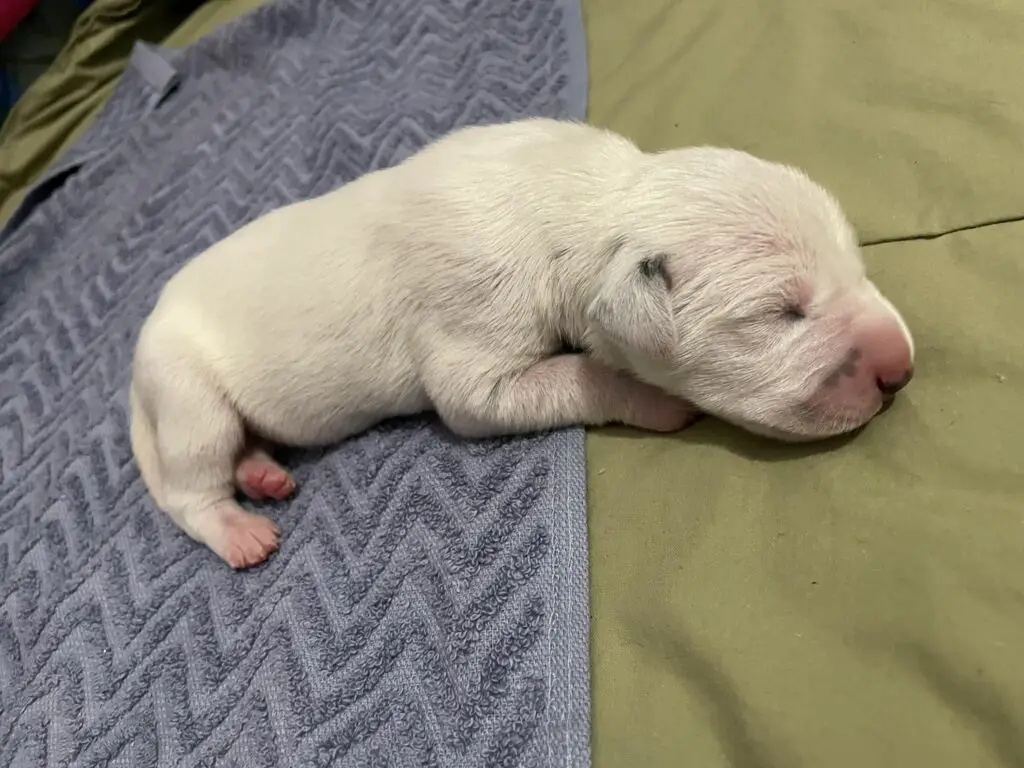
A dog may separate one puppy from the rest due to a variety of reasons including maternal instincts, illness or weakness in the puppy, stress response, lack of resources, inexperience, the puppy’s temperament, human intervention, environmental factors, protection, and natural selection.
Maternal Instincts
Maternal instincts in dogs are strong. They have evolved to protect and nurture their offspring. Sometimes, a mother dog might sense something different or off with one of her puppies. This could be anything from a health issue to an unusual behavior or smell.
In such cases, her maternal instincts might compel her to separate this puppy from the rest of the litter. She does this not out of rejection, but due to an instinctive drive to maintain harmony within the litter and to address the unique needs of the separated puppy.
Illness
As a vet, I’ve witnessed many times how remarkably perceptive a mother dog can be when it comes to detecting illness in her puppies. If a puppy is sick, it may exhibit subtle signs such as being less active, eating less, or having a different smell.
The mother dog can pick up on these signs and may choose to separate the sick puppy from the rest of the litter. This is a protective measure to prevent any potential disease from spreading to other healthy puppies.
Weakness

In a litter, there can sometimes be a puppy that is weaker than its siblings. This could be due to a variety of reasons such as being the last one born, being smaller in size (often referred to as the runt), or having a slower development rate.
The mother dog might separate this weaker puppy to provide it with more focused care and attention. By doing so, she aims to help the weaker puppy catch up with its siblings in terms of growth and development.
Stress Response
Motherhood can be stressful, even for dogs. If the mother dog is feeling overwhelmed by the demands of caring for her entire litter, she may respond to this stress by separating one puppy.
This doesn’t mean she’s neglecting or rejecting the separated puppy. Instead, it’s her way of coping by managing the size of the litter she needs to attend to at any given time.
Lack of Resources
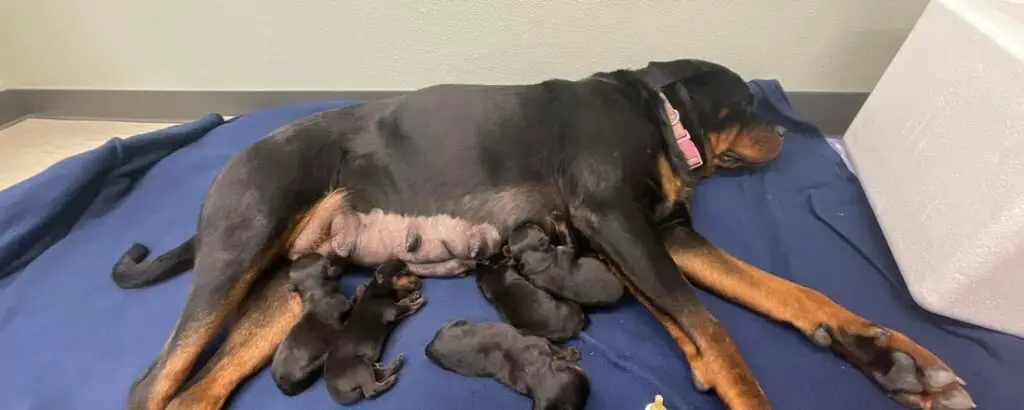
In situations where resources such as food or space are limited, a mother dog may find it difficult to adequately care for all her puppies.
This scarcity could lead her to make a tough decision to separate one puppy to ensure the survival and well-being of the rest of the litter.
Inexperience
First-time mother dogs, just like first-time human mothers, can be unsure and inexperienced. They might not know how to react to certain situations or how to properly care for their entire litter.
This inexperience can sometimes result in them separating one puppy, either intentionally or unintentionally.
Puppy Temperament
Puppies, just like human children, have different temperaments. Some are calm and quiet, while others are active and boisterous.
If one puppy’s temperament is causing disruption to the litter – perhaps it’s too aggressive or too active – the mother dog may separate it to maintain peace within the litter.
Human Intervention
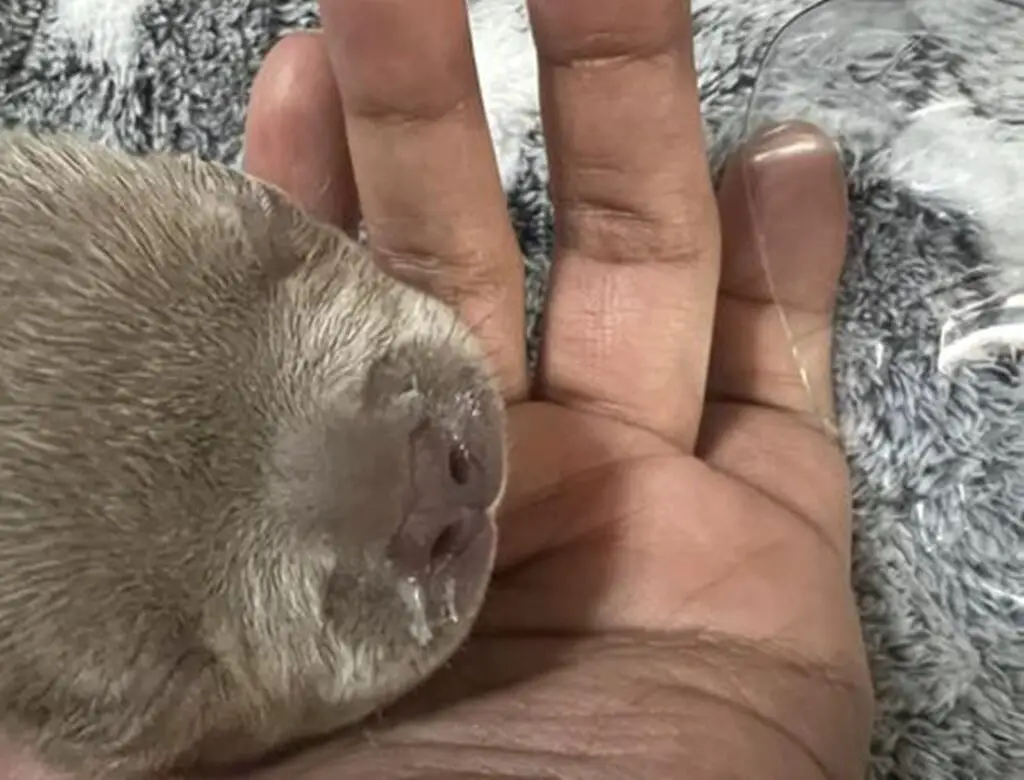
Human intervention can sometimes disrupt the natural bonding process between a mother dog and her puppies. If a puppy is handled excessively by humans or if it spends a lot of time away from its mother and siblings, it can acquire different smells.
These scent changes might cause the mother dog to not recognize the puppy as her own, leading to her separating it from the litter.
Environmental Factors
Environmental factors such as temperature, noise level, and space can significantly influence a mother dog’s behavior.
If the environment is too hot, too loud, or too cramped, the mother dog might find it stressful or unsuitable for her entire litter. To manage this, she might separate one puppy, possibly with the intention of moving it to a more suitable location.
Protection
At times, a mother dog might separate one puppy to protect it. This could be protection from siblings who play too rough, or from other animals or potential threats in the environment.
By separating the vulnerable puppy, she ensures it remains safe and unharmed.
Natural Selection
Sometimes, the harsh reality of natural selection comes into play. A mother dog might instinctively separate a weaker or sick puppy to increase the survival chances of the stronger and healthier puppies.
This behavior is more common in wild animals but can occasionally be observed in domestic dogs as well.
What To Do If Your Dog Separates One of Her Puppies
If a mother dog separates one of her puppies from the rest of the litter, it’s important to monitor the situation closely and consult with a vet if necessary, as it could indicate a health issue in the puppy or stress in the mother.
Monitor the Situation
From my experience as a vet, I’ve seen that sometimes mother dogs might temporarily separate a puppy if they’re feeling overwhelmed or stressed.
However, if the separation continues for an extended period, it could be a sign of a problem. Keep a close eye on the mother and the separated puppy, watching for any signs of illness or distress.
Check the Puppy’s Health
The mother dog might be instinctively isolating the puppy because she senses a health issue.
Carefully observe the separated puppy for any signs of illness such as lethargy, lack of appetite, difficulty breathing, or unusual behavior. If you notice anything concerning, it’s crucial to seek veterinary attention immediately.
Assess the Mother’s Behaviour
It’s also important to assess the mother’s behavior. If she seems anxious, aggressive, or unusually protective of her other puppies, it could be a sign of stress or a lack of maternal instinct.
In such cases, it might be beneficial to provide a quieter, more comfortable environment for the mother and her puppies.
Seek Veterinary Advice
If the mother continues to separate the puppy or if you notice any signs of illness in the puppy or the mother, it’s best to consult with a vet.
They can examine both the mother and the puppy, identify any potential health issues, and provide appropriate advice and treatment.
Hand-Rearing if Necessary
If the mother dog refuses to care for the separated puppy, you may need to step in and hand-rear the puppy.
This should be done under the guidance of a vet to ensure the puppy receives proper nutrition and care. Hand-rearing a puppy is a significant commitment, as newborn puppies require feeding every two to three hours, but it can be a rewarding experience.
Why Is My Dog Not Feeding One Of Her Puppies?
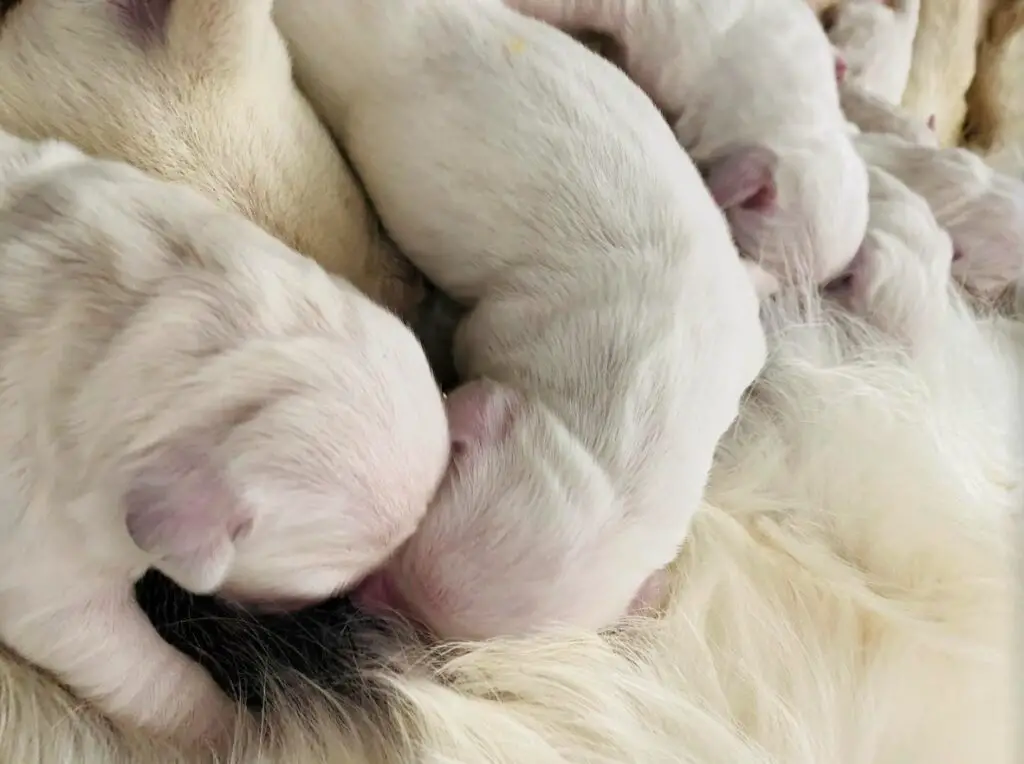
A dog may not feed one of her puppies due to several reasons such as health issues in the mother or the puppy, stress, lack of maternal instinct, scarcity of resources, or natural selection instincts.
Health Issues in the Mother
As a vet, I’ve seen cases where a mother dog suffers from a condition like canine mastitis, which is a bacterial infection of the mammary glands.
This infection can cause pain and discomfort, making nursing her puppies difficult. If she’s experiencing this discomfort predominantly on one side, she might avoid feeding a puppy that prefers nursing from that side.
Health Issues in the Puppy
Mother dogs are incredibly perceptive and can often detect if something is off with one of their puppies. If a puppy is unwell, it may smell different, behave differently, or nurse weakly.
Sensing this, the mother dog might stop feeding the affected puppy to prevent potential disease spread or because she instinctively knows the puppy is too weak.
Stress
The process of pregnancy, delivery, and caring for puppies can be quite stressful for a dog, particularly if she’s a first-time mother. This stress might lead her to neglect or stop feeding one of her puppies.
Lack of Maternal Instinct
In some cases, a lack of maternal instinct can cause a mother dog to not feed one or more of her puppies. This usually happens when the mother dog has low levels of oxytocin, the hormone that plays a significant role in bonding, caregiving, and nursing.
Scarcity of Resources
If the mother dog doesn’t have enough milk to feed all her puppies, she might choose to neglect one to ensure that the rest get enough nourishment. This is a tough decision made out of necessity, driven by the instinct to maximize the survival chances of the majority of her litter.
Natural Selection Instincts
Sometimes, natural selection instincts might come into play. If one puppy is weaker or less likely to survive, the mother dog might instinctively choose to invest her resources and energy into the healthier puppies, leading to neglect of the weaker one.
Should I Force My Dog To Feed Her Puppies?
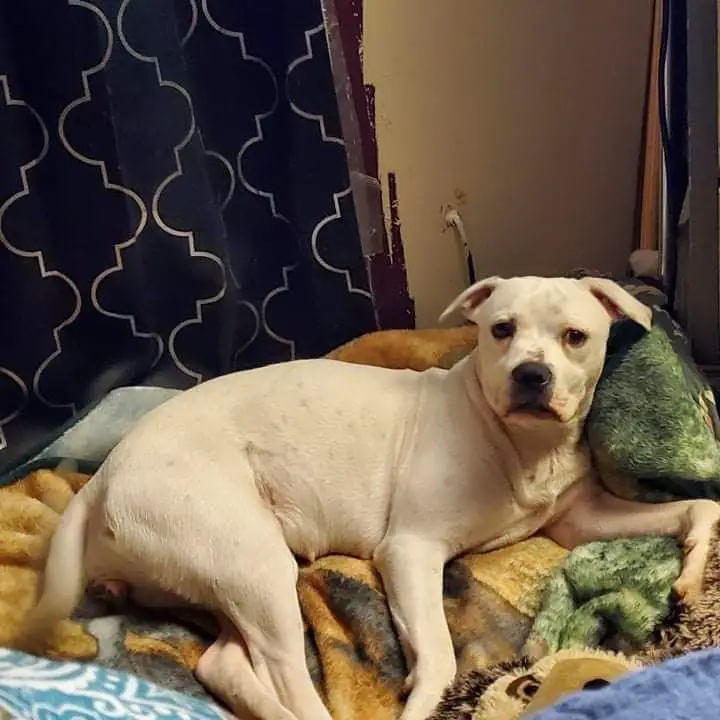
While it’s crucial for puppies to receive adequate nutrition, forcing a mother dog to feed her puppies isn’t typically recommended due to the risk of causing stress and potential harm to both the mother and the puppies.
In my years as a veterinarian, I’ve often found that forcing a mother dog to nurse can lead to her feeling stressed and anxious, which can negatively impact her milk production and overall health. It can also potentially lead to behavioral issues in the mother dog.
If the mother dog is refusing to nurse her puppies, it’s important to try and identify the underlying cause. Health issues in either the mother or the puppies, stress, lack of maternal instincts, or environmental factors could all be contributing to this behavior.
For instance, if the mother dog is in pain due to an infection or an injury, she may refuse to nurse. In such cases, medical intervention would be required to address the root cause of the pain.
On the other hand, if the environment is too noisy or crowded, she might feel stressed and unsafe, leading to nursing refusal. Addressing these environmental factors can help in such scenarios.
If you’re unable to identify the cause or if the mother continues to refuse to nurse, it’s best to consult with a vet. They can examine the mother and the puppies, determine the cause, and provide appropriate advice and treatment.
In the meantime, it might be necessary to hand-feed the puppies using a puppy milk replacer. This should be done under the guidance of a vet to ensure the puppies are receiving the right nutrients in the correct amounts.
How Long Can Newborn Puppies Go Without Nursing?
Newborn puppies ideally should nurse from their mother every two to three hours, but they can survive up to seven hours without nursing.
In the first week of a puppy’s life, regular nursing is crucial not only for nutrition but also for the antibodies in the mother’s milk that help protect the puppy from diseases.
As a vet, I’ve often emphasized to pet owners the importance of these early feedings. If a newborn puppy goes without nursing for more than seven hours, it can lead to hypoglycemia (low blood sugar), which can cause weakness, confusion, seizures, and in severe cases, even death.
However, each situation can vary. For instance, larger breed puppies have slightly more fat reserves and might be able to go a bit longer without feeding compared to smaller breeds. But this doesn’t mean it’s safe or healthy for them to do so.
If for any reason, a puppy cannot nurse from its mother, it’s crucial to seek immediate veterinary attention. The vet can guide you on how to hand-feed the puppy using a suitable puppy milk replacer. This should be done carefully to prevent aspiration, which can occur if the puppy inhales the milk into its lungs.
It’s worth noting that hand-rearing puppies is time-consuming and challenging, especially since newborn puppies need to be fed every few hours, including at night. But with patience and proper guidance, it’s possible to successfully raise healthy, happy puppies says WikiPedia.
When To Seek Veterinary Assistance If Mother Keeps Separating One Puppy
Seeking veterinary assistance becomes essential if a mother dog consistently separates one puppy and if any signs of distress or illness are observed in the mother or the puppy.
In my experience as a veterinarian, I’ve seen cases where mother dogs separate a puppy due to innate instincts that something might be wrong with the pup.
This could range from developmental issues to sickness, which she might sense before it’s apparent to us. It’s always advisable to closely observe both the mother and the puppy for any signs of abnormal behavior or health issues.
For instance, if the puppy shows signs of weakness, lack of appetite, difficulty breathing, or unusual behavior, it’s critical to consult a vet. Similarly, if the mother dog appears stressed, anxious, or overly protective, these could also be indications that she is uncomfortable or sensing something unusual about the separated puppy.
Sometimes, a mother dog might separate a puppy because she’s overwhelmed by caring for all her puppies. In such cases, providing a quiet, comfortable environment might help. However, if she still continues to isolate the puppy, it’s best to seek professional advice.
A vet can conduct a thorough examination of both the mother and the puppy to identify any potential health issues. They can also guide you on how to care for the separated puppy, including hand-rearing if necessary.
Hand-rearing a puppy requires feeding every two to three hours and is a significant commitment but can be a rewarding experience when done correctly.
FAQs
Q: Should I be concerned if my dog separates one puppy from the rest?
A: It depends. If the mother dog is taking care of the separated puppy and it appears healthy, there may not be a cause for concern. However, if the separated puppy is not receiving adequate care or is showing signs of distress, it is important to seek veterinary advice.
Q: Can a mother dog separate one of her puppies if she has separation anxiety?
A: Yes, it is possible. Dogs with separation anxiety may exhibit behavior problems such as separating one of their puppies from the litter. It’s important to address the separation anxiety issue in such cases and consult with a veterinarian or a professional dog trainer for guidance.
Q: At what age do puppies typically separate from their mother?
A: Puppies can start to be weaned from their mother’s milk and separate from her around 6 to 8 weeks of age. However, this can vary depending on the breed and the individual mother dog. It’s important to monitor the puppies’ development and consult with a veterinarian for guidance.
Q: Can I separate the puppies from their mother earlier than 6 to 8 weeks of age?
A: It’s generally not recommended to separate puppies from their mother before they are at least 6 to 8 weeks old. During this time, the puppies learn important social and behavioral skills from their mother and littermates. Separating them too early can negatively impact their development.
Q: Can I bottle-feed the separated puppy if the mother dog is not caring for it?
A: Yes, if the mother dog is not caring for the separated puppy, you may need to step in and bottle-feed the puppy. It’s important to consult with a veterinarian or a professional breeder for guidance on how to properly bottle-feed a young puppy.
Q: What can I do to help the separated puppy thrive?
A: To help the separated puppy thrive, ensure it receives proper nutrition, warmth, and socialization. Create an appropriate whelping box or area for the puppy, consult with a veterinarian for guidance on feeding and care, and provide plenty of love and attention to help the puppy develop and grow.
Q: Is it common for a mother dog to separate one puppy from the rest?
A: It is not uncommon for a mother dog to separate one puppy from the rest of the litter, especially if she senses that the puppy needs extra care or attention. Every mother dog and litter is different, and their behavior can vary.
Conclusion and final thoughts
In conclusion, it is not uncommon for a mother dog to separate one of her puppies from the rest of the litter.
This instinctual behavior serves as a way to protect and provide extra care for the chosen puppy, ensuring its survival in the early stages of life.
However, it is important for dog owners to monitor this behavior and intervene if necessary, as it can sometimes lead to detrimental effects on the separated puppy’s development and socialization skills.




